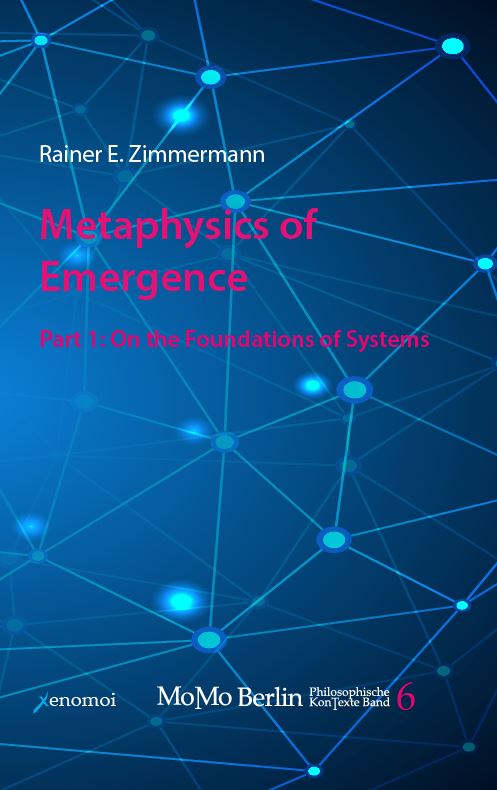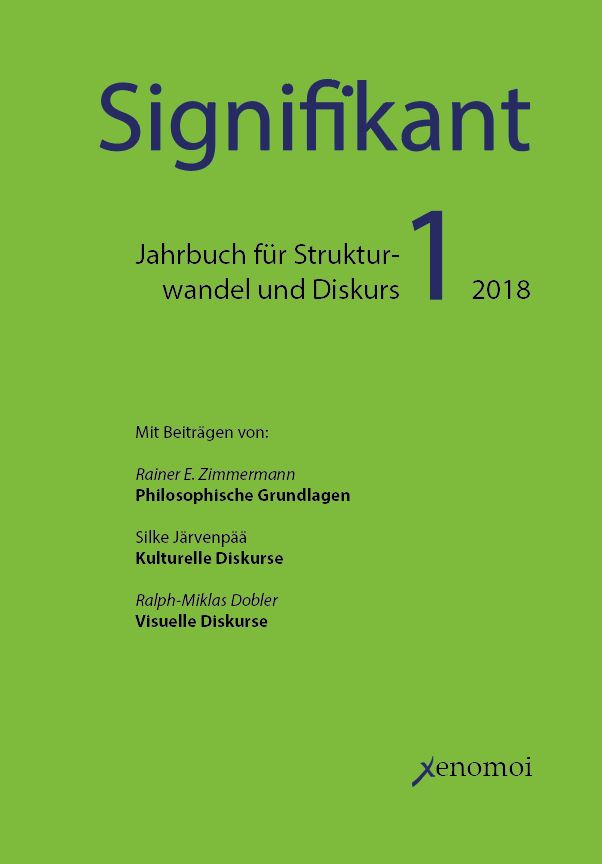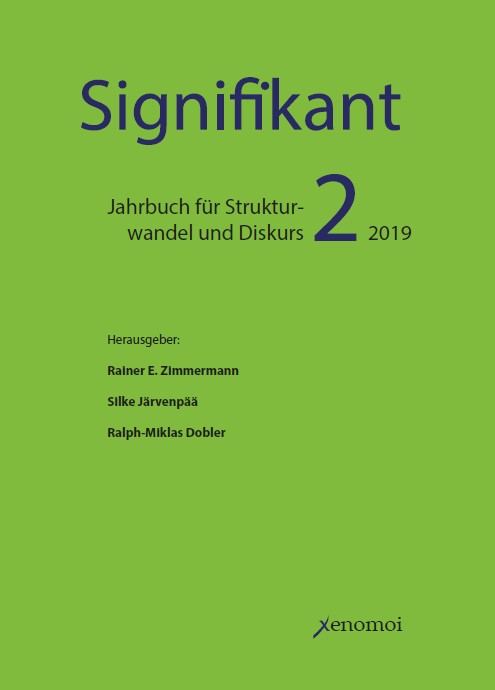Zimmermann, Rainer E.
Rainer E. Zimmermann, Professor for philosophy at the Ludwig-Maximilian-University of Munich, Germany, is one of the leading contemporary philosophers in the crossdisciplinary field of metaphysics and natural sciences, especially physical science.

In fact, the theory of (emergent complex) systems as a recently more forthcoming (and somewhat reformed) discipline in its own right has been object of acute and intensive discussion and of a rather dynamical evolution, respectively, for quite some while. Unfortunately, this still ongoing discussion has not been very successful so far as to clarifying the most elementary and fundamental issues of definition and the consequences derived there-from. This is mainly because the otherwise welcome interdisciplinary discourse has been dominated originally by protagonists from the fields of economics, management, and the social sciences, in the first place, rather than by those of the more formalized sciences such as physics. However, the degree of universality of a theory is likely to increase with its connectivity to mathematics. Hence, in order to obtain a self-consistent theory of systems that displays a sufficient coherence with a view to its respective lexicology, syntax, and semantics, it is necessary to perform an explicit embedding into available formalisms of mathematical type such that its specific contextuality can be immediately reflected within the given frame of what is already known about the structure and evolution of nature. This motivation underlies this present project which can be understood as a survey on systems in terms of a suitable metaphysics of emergence. The mathematically based explication of systems is the first step (and thus constitutes the first volume) of a panoramatic approach to what we euphemistically call the world. But we shall bear in mind what the important point is after all: To look for the possibilities of grasping experience whilst recognizing that experience is always more than what can be said about it. Rainer E. Zimmermann studierte von 1971-1975 Physik und Mathematik an der TU and FU Berlin, erwarb 1974 sein Diploma am Imperial College in Mathematischer Physik, 1975 sein Diplom in Theoretischer Physik an der FU Berlin, promovierte 1977 in Mathematik an der FU Berlin. Es folgten 1982-1988 Studien in Philosophie, Geschichte und Literatur und 1988 seine zweite Promotion als Philosoph an der TU Berlin. Seit 1995 hat er eine Professur für Philosophie an der UAS München, 1998 folge die Habilitation. In 1999/2000 war er Visiting Scholar at the History and Philosophy of Science Department und Visiting Fellow of Clare Hall, beide in Cambridge (UK), und ist seitdem Life Member of Clare Hall. Seit 2003 ist er an verschiedenen Universitäten in Europa (z.B. Bologna, Salzburg, TU Berlin, Wien), Mitherausgeber von Fachzeitschriften und Mitglied der Leibniz Sozietät, Berlin. Er hat bisher ca. 350 Texte veröffentlicht, darunter 25 Bücher. 272 Seiten, gebundene Ausgabe ISBN: 978-3-942106-29-0 / 24,80 €

Transcendental materialism, essentially starting from Schelling’s philosophy, is one which deals with the re-actualization of a project that has its origin within the Tübingen axiomatic (basically developed at the time in the vicinity of Hölderlin, Schelling, Hegel). This early project aims at the construction of a system of worldly concepts, as does transcendental materialism. Starting with the thinking of this influential German philosopher, the objective of Rainer E. Zimmermann’s novel approach is to interpret all of this with a view to the totality of what can be cognitively observed, thus establishing the complete system of the world (in the sense of Hans Heinz Holz: the Gesamtzusammenhang) within a unified theory of the possible structures of knowledge. This totality is associated with a dialectic form which determines its processuality. On his way to an encompassing theory of the world as a procedural structure Rainer E. Zimmermann surveys a wide range of distinguished authors who dealt with similar questions, beginning with Spinoza up to the very present. He brings together famous accounts and opinions both from the philosophical and the scientific field of research in order to create a coherent, scientifically based conclusion on how to settle many of the questions raised hereby. Rainer E. Zimmermann studierte von 1971-1975 Physik und Mathematik an der TU and FU Berlin, erwarb 1974 sein Diploma am Imperial College in Mathematischer Physik, 1975 sein Diplom in Theoretischer Physik an der FU Berlin, promovierte 1977 in Mathematik an der FU Berlin. Es folgten 1982-1988 Studien in Philosophie, Geschichte und Literatur und 1988 seine zweite Promotion als Philosoph an der TU Berlin. Seit 1995 hat er eine Professur für Philosophie an der UAS München, 1998 folge die Habilitation. In 1999/2000 war er Visiting Scholar at the History and Philosophy of Science Department und Visiting Fellow of Clare Hall, beide in Cambridge (UK), und ist seitdem Life Member of Clare Hall. Seit 2003 ist er an verschiedenen Universitäten in Europa (z.B. Bologna, Salzburg, TU Berlin, Wien), Mitherausgeber von Fachzeitschriften und Mitglied der Leibniz Sozietät, Berlin. Er hat bisher ca. 350 Texte veröffentlicht, darunter 25 Bücher. 217 Seiten, als gebundene Ausgabe (Softcover) und als Sofort-Download (PDF) erhältlich. ISBN: 978-3-942106-24-5 / 24,80 €

In der letzten Zeit beschäftigt sich die Öffentlichkeit verstärkt mit Phänomenen wie Fake News (Falschnachrichten) oder Alternativen Fakten (nach einer Wortschöpfung der Sprecherin von US-Präsident Trump) – vor allem auch im Hinblick auf die Wirkung der neuen Medientechniken, voran das Internet. Tatsächlich kann man leicht einsehen, daß die genannten Phänomene keineswegs neue Phänomene sind, auch, wenn sie mit einer modischen Bezeichnung auf Neudeutsch belegt werden. Es scheint vielmehr so zu sein, daß es in der Hauptsache die neuen Medien sind, die mittels neuer Formen der kommunikativen Vernetzung bewirken, daß diese Phänomene, die es immer schon gab, nun lediglich massiert auftreten und dadurch ihre Form verändern. Anders gesagt, schlägt hier wohl wirklich, auf gut beobachtbare Weise, Quantität in Qualität um. Die Beiträge: Rainer Zimmermann: Philosophische Grundlagen: Entwicklungslinien des Wilden Denkens. Häufig beobachtbare Beispiele. Verbreitete Strategien heute. Diskurs / Diskurstheorie / Diskursanalyse.Geopolitik und Diplomatie. Lektüren von Karl Marx: Althusser, Foucault. Silke Järvenpää: Kulturelle Diskurse: England und der Brexit. “Rule Britannia, Britannia rule(s) the Waves”. Jenseits von ‚Mythos‘: Donald Trump und die Treue seiner Unterstützer. Die Kultur der Überwachung I: „Big Brother is watching you“. Hip-Hop, Orwell und Foucault: Juice Rap News und “Big Brother is wwwatching you”. Die Kultur der Überwachung II: Sousveillance, self monitoring und die Folgen. Brexit, Trump und Überwachung: Dreimal Kulturpessimismus Ralph-Miklas Dobler: Visuelle Diskurse. Bilddiskurs am Beispiel der Elektrizität. Grundlagen der Bildwirkung I: Immersion. Grundlagen der Bildwirkung II: Präsenz und Expansion. Colin Powells PowerPoint-Präsentation vor dem UN-Sicherheitsrat – Multimodaler Diskurs und visueller Wahrheitsbeweis. Germany’s Next Topmodel und die mediale Konstruktion von Schönheit. Die Allmacht von Heidi Klum. Die Show als lebensverändernder Übergangsritus. Entmenschlichung und Verdinglichung der Teilnehmerinnen. Bilder als Instrument des internationalen Terrorismus. Terrorismus, Medien und Bilder. 9/11: eine neue Dimension des Terrorismus. Krieg mit Bildern. Soziale Medien und Terrorismus. Terrorismus und soziale Medien. Einband: Hardcover-Bindung, Deckelteile aus besonders knickfestem Polyester. Dobler, R.-M.; Järvenpää, S.; Zimmermann, R.: Signifikant. Jahrbuch für Strukturanalyse und Diskurs / Band 1 (2018) - ISBN: 978-3-642106-62-7 18,- € (keine Versandkosten)

Herausgeber: Rainer E. Zimmermann, Silke Järvenpää und Ralph-Miklas Dobler Der Schwerpunkt der fortlaufenden Untersuchung hat sich inzwischen vom allgemeinen öffentlichen Diskurs auf den Wissenschaftsdiskurs selbst verlagert. Das hat vor allem den Grund, daß die hier in Frage stehenden Phänomene, wie „Fake News“ und „Alternative Fakten“, längst umfänglich ihren Einzug auch in die Wissenschaften gehalten haben und dort eine schädliche Wirkung entfalten, welche die Fundamente des Wissens und der Reflexion aufzuweichen, wenn nicht überhaupt zu zerstören, imstande ist. Offenbar ist die Bereitschaft, zugunsten der eigenen Argumentation großzügig über konstatierte Fakten hinwegzugehen oder diese umzuinterpretieren, stark angestiegen. Auffassungen, Sichtweisen, Haltungen oder einfach nur Meinungen werden nur als solche anerkannt, wenn sie von vornherein dem entsprechen, was man selbst vertritt. Die Beiträge: Hubert Steiner: Governing Discourse and Symbolic PowerFranziska Holzner: Heimatdesign as a Discipline of Social Systems DesignSenka Grossauer, Spomenka Celebić: Populism and Social MediaRainer E. Zimmermann: Savage Thought and Totalitarianism Francesca Vidal: Irrational discourse as a form of violation of the other with words Ralph-Miklas Dobler: Social Media as Positive SpacesHubert Steiner: Populismus als symbolische GewaltFrancesca Vidal: Verletzende Bilder und Worte – Hate Speech auf WebsitesFelix Breu: Conceptions of Rational and Irrational DiscourseSilke Järvenpää: Von Impfgegnern und Kreationisten: Fake ScienceHubert Steiner: Empörung und Veränderung. Zur politischen Philosophie der multitudoFelix Breu: Mythisches Denken in einer digitalisierten GesellschaftLena Hendlmeier: Reloaded – Das kreative Spiel der digitalen WeltDoris Zeilinger: Fiktion und FakeWolfgang Hofkirchner: Zur Konzeptualisierung der Wahrheit aus der Sicht der Praxeo-Onto-EpistemologieRainer E. Zimmermann: Principiis Obstate! Totale Struktur und kritische FunktionMalte Christiansen, Josefa Jordan, Sandra Ngoing, Katharina Zemisch: Öffentliche Diskurse im Zeitalter der Digitalisierung am Beispiel des KlimawandelsRainer E. Zimmermann: Hegel & Bloch RezensionenRainer E. Zimmermann über Alfred Dandyk: Sartres realistischer PerspektivismusRainer E. Zimmermann über Philipp Otto, Eike Gräf: Ethics. A Re-Invention of Ethics in the Digital Age?Rainer E. Zimmermann über Mariano Zukerfeld: Knowledge in the Age of Digital Capitalism. An Introduction to Cognitive Materialism und Rainer Fischbach: Die schöne Utopie. Paul Mason, der Postkapitalismus und der Traum vom grenzenlosen Überfluß Einband: Hardcover-Bindung, Deckelteile aus besonders knickfestem Polyester. Dobler, R.-M.; Järvenpää, S.; Zimmermann, R.: Signifikant. Jahrbuch für Strukturanalyse und Diskurs / Band 2 (2019). 310 Seiten - ISBN: 978-3-642106-72-624,- € (keine Versandkosten)
